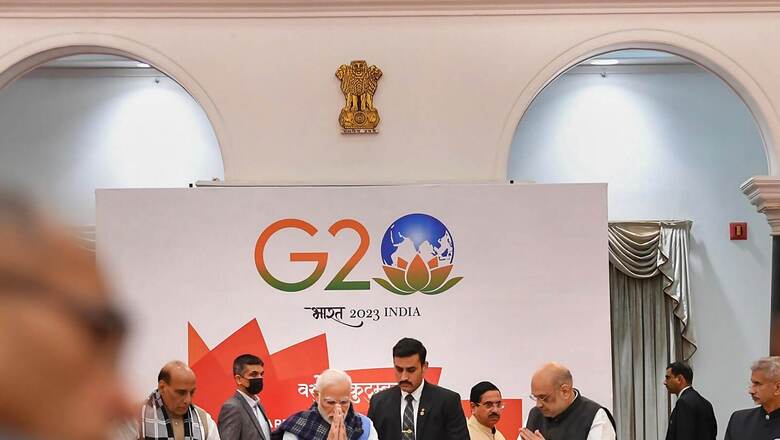
views
India has kicked off the G20 Presidency on a decisive note. Prime Minister Mr Narendra Modi has built the right narrative on technology and its role in solving human problems at scale. He also endorsed the scalability of digital technologies in the massive digital worlds that we inhabit today. In fact, India can play a key role in shaping the technology and digitalization of the world. And the G20 Presidency offers that impetus and opportunity.
The G20 is a strategic political and economic bloc. And it represents two-thirds of the world’s population of eight billion. Taking on the G20 presidency is a milestone moment in the course of Indian diplomacy. The Indian leadership should leverage this forum to converge global titans on the use of emerging technologies to redraw the contours of diplomatic discourse. Whether it is Tech for diplomacy or the intersection of technology and diplomacy- India can anchor the next Tech-ade of multilateral change.
Our leadership at the G20 forum can build on the success of the Digital India campaign. The Modi government has spearheaded technology adoption in governance- the most notable being the use of Aadhaar in vaccine rollout and deploying drones for vaccine delivery in remote locations. The other success story worth flaunting is the JAM troika interlinking the Jan Dhan accounts, Aadhaar numbers and Mobile numbers- this has helped to plug leakages of government subsidies through DBT and Unified Payments Interface (UPI).
Technology has kept the Indian economy chugging on a growth track when some of the highly developed economies are faltering. India has unveiled a massive plan to train three million officials nationwide on emerging technologies like AI, machine learning, and blockchain for effective governance and service delivery at the grassroots. Once the policymakers are exposed to the potential of disruptive technologies, they can apply them in underexplored areas like resolving bipartite or multilateral crises, ensuring seamless cross-border data flows, tackling climate action and stymieing efforts of rogue elements.
Emerging technologies can be catalysts in building secure and inclusive economies. Global crises of tomorrow will not stem from gory world wars but from debilitating cyber-attacks on financial infrastructure and critical business systems like banks, stock markets and payment systems. The G20 bloc which brings together leading digital and industrial powers has a collective interest in safeguarding critical infrastructure.
In the near future, critical infrastructure, financial systems, and communication would shift gears to an increasingly decentralized internet. Niche technologies like Web3, blockchain and AI have massive potential to strengthen democracies and global economic security while narrowing the digital divide. However, technology adoption worldwide comes with attendant problems like increased exposure to cyber threats, complexities around critical resources and supply chains, and environmental concerns.
India should rally around its G20 peers on strategic tech diplomacy. It is an emerging form of statecraft which engages non-state actors in the international arena to discuss the future of technology and foreign policy in the digital space. Governments can wrest the initiative and rope in business, civil society, and institutions, and equip global leaders with the knowledge and understanding of how emerging technologies work.
Public-private synergy is on the rise, connecting and engaging international leaders with emerging technologies. Multilateral platforms like the UN and the Climate Change Conference are the most credible platforms for public-private partnerships. The G20 can grow as an engaging platform for tech diplomacy. For the first time, the United Nations Security Council met in May 2021 to discuss the role of artificial intelligence (AI) in peace and security. A month later, the Security Council discussed how to maintain peace in cyberspace, ushering emerging technologies into the highest level of diplomatic efforts at the UN. The UN member states spent USD 1 trillion in 2020 to restore networks that had been breached or to combat malicious uses of technology.
The G20 grouping, too, can emerge as the pivot for tech diplomacy. The need to leverage technologies to build an inclusive environment and economy for all is a common thread that binds the member countries.
Tech diplomacy will be shaped not just by heads of state or diplomats, but by many other players as well. Creating a digitalized world that is open, secure, and reliable will need full-scale collaboration by leaders across sectors and institutions.
Today, there are three major threats to global security- mounting geopolitical tensions, the climate crisis, and global mistrust. Plus, there is the flip side of technology being used to commit crimes, fan hatred, peddle misinformation, and oppress people in an increasing number of countries. Tech diplomacy can be the best antidote to existential and emerging threats. The dawn of tech diplomacy has set in. And the room for growth at the intersection of technology and diplomacy will transcend boundaries.
(Priyadarshi Nanu Pany is the founder and CEO of CSM Technologies.)
Read all the Latest Business News here




















Comments
0 comment